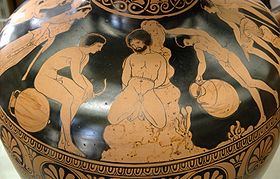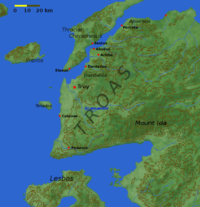- Dardanians (Trojan)
-
This article is about the terms Dardan and Dardanian in classical writings. For the Shannara character, see Dardan (Shannara)."Dardanoi, Trojan allies" redirects here. For The Illyrian tribe, see Dardanii.
 Amycus punished, red-figured Lucanian hydria, end of 4th century BC, Cabinet des Médailles. A prominent Trojan during the Trojan War
Amycus punished, red-figured Lucanian hydria, end of 4th century BC, Cabinet des Médailles. A prominent Trojan during the Trojan War
The terms Dardanoi (Greek: "Δάρδανοι"), - its anglicized modern terms being Dardanians or Dardans & Dardan - in classical writings were synonymous with the term Trojan, the Dardanoi being Trojans themselves, an ancient people of the Troad, located in northwestern Anatolia. The Dardanoi derived their name from Dardanus, the mythical founder of Dardania, an ancient city in the Troad. Rule of the Troad was divided between Dardania and Troy. Homer makes a clear distinction between the Trojans and the Dardanoi.[1]
Contents
Dardanoi & Trojans
The Royal House of Troy was also divided into two branches, that of the Dardanoi, and that of the Trojans (their city being Troy, or, in Latin; Ilium). The House of the Dardanoi (its members being the Dardanides[2], Greek: "Δαρδανίδες") was older than the House of Troy, but Troy later became more powerful. Aeneas is referred to in Virgil's Aeneid interchangeably as a Dardanian or as a Trojan, but strictly speaking, Aeneas was of the branch of the Dardanoi. Many rulers of Rome claimed descent from Aeneas and the Houses of Troy and Dardania. Homer adds the epithet Dardanidi (Δαρδανίδη) to Priam and to other prominent characters denoting that they are members of the house of the Dardanoi.
"The Dardanians were led by brave Aeneas, whom the fair Aphrodite, a goddess bedded with a mortal man, bore to Anchises in the mountains of Ida. He was not alone, for with him were the two sons of Antenor, Archilochus and Acamas, both skilled in all the arts of war"
The strait of the Dardanelles was named after the Dardanoi, who lived in the region.
Origins
The ethnic affinities of the Dardanoi, and of the Trojans, and the nature of their language remain a mystery. The remains of their material culture reveal close ties with Luwian[4] other Anatolian[5] groups, Thracians[6] and Greek contact. Homer writes the elite was mixed but predominantly Greek[7] and the Romans considered them to be Greek as a whole.[8] They are totally unrelated to the later Illyrian tribe of the same name [9]
Archaeological finds from the Troad dating back to the Chalcolithic period show striking affinity to archaeological finds known from the same era in Muntenia and Moldavia, and there are other traces which suggest close ties between the Troad and the Carpatho-Balkan region of Europe. Archaeologists in fact have stated that the styles of certain ceramic objects and bone figurines show that these objects were brought into the Troad by Carpatho-Danubian colonists; for example, certain ceramic objects have been shown to have Cucuteni origins.[10]
Variations of the name
Other words used by Homer are;
- Dardaniones[11], "Δαρδανιώνες" denotes Trojans in general
- Dardanoi, "Δάρδανοι", descendants of Dardanus, but also Trojan descendants of Assarakos[11]
- Dardanioi, "Δάρδανιοι", same as above
- Dardanides, "Δαρδανίδες", descendants of Dardanus,[2] plural is sometimes used for women[12] in the Aeneid
- Dardanion, "Δαρδανίων"
- Dardaniaon, "Δαρδανιάων"
- Dardanidao,"Δαρδανίδαο", son of Dardanus[13]
Etymology
Robert Graves connected Greek δάρδανος, "burned up" (from the verb, δαρδάπτω, dardapto, "to wear, to slay, to burn up")[14]
See also
References
- ^ "Review: Some Recent Works on Ancient Syria and the Sea People", Michael C. Astour, Journal of the American Oriental Society, Vol. 92, No. 3, (Jul. - Sep., 1972), pp. 447-459 writing about someone who identified the Dardanoi with the Trojans: "Which is,incidentally, not so: the Iliad carefully distinguishes the Dardanoi from the Trojans, not only in the list of Trojan allies (11:816-823) but also in the frequently repeated formula keklyte meu, Tr6es kai Dardanoi ed' epikuroi (e.g., III:456)
- ^ a b Vergil: Aeneid 10, Tome 10
- ^ Hom. Il. 2,819-823. (Translated by Terence Chan)
- ^ Trojans and Their Neighbours: An Introduction (Ancient Peoples) by T, Bryce,2005,page 117: "... question, we might have a clearer indication of the Trojans' ethnic origins. We have referred to the widespread distribution of Luwian- ..."
- ^ Art of the First Cities: The Third Millennium B.C. from the Mediterranean to the Indus (Metropolitan Museum of Art Series) by Joan Aruz,2003,page 255,"... and the type and technology of the alloy are of Anatolian, and specifically Trojan, origin. ..."
- ^ The National Encyclopædia: A Dictionary of Universal Knowledge: By Writers of Eminence in Literature, Science, and Art. Volume 14 : Tri - Z by unknown author,2001,page 22: "... his allies. The inhabitants of the Troad were probably of Thracian origin. At the time of the Trojan War they had reached a higher state of prosperity and ..."
- ^ Trojans and Their Neighbours: An Introduction (Ancient Peoples) by T, Bryce,2005,page 23
- ^ Greeks and Barbarians (Edinburgh Readings on the Ancient World) by T. Harrison,2001,ISBN 0415939593,page 140
- ^ Macurdy, Grace Harriet, The Wanderings of Dardanus and the Dardani, Transactions and Proceedings of the American Philological Association, Vol. 46 (1915), pp. 119-128
- ^ Hoddinott, Ralph F., The Thracians, Thomas & Hudson Inc., 1981. Pgs.35-38
- ^ a b The Iliad: a commentary
- ^ Lemprière's Classical dictionary
- ^ The Cambridge companion to archaic Greece
- ^ The Greek Myths by Robert Graves,ISBN 0140171991
External links
Categories:- Trojans
Wikimedia Foundation. 2010.

